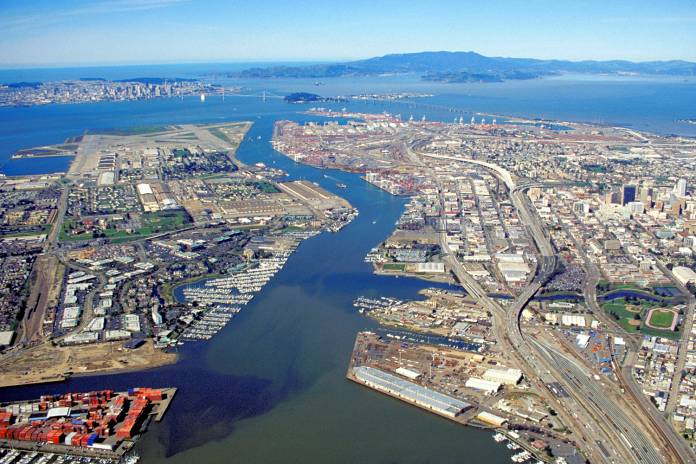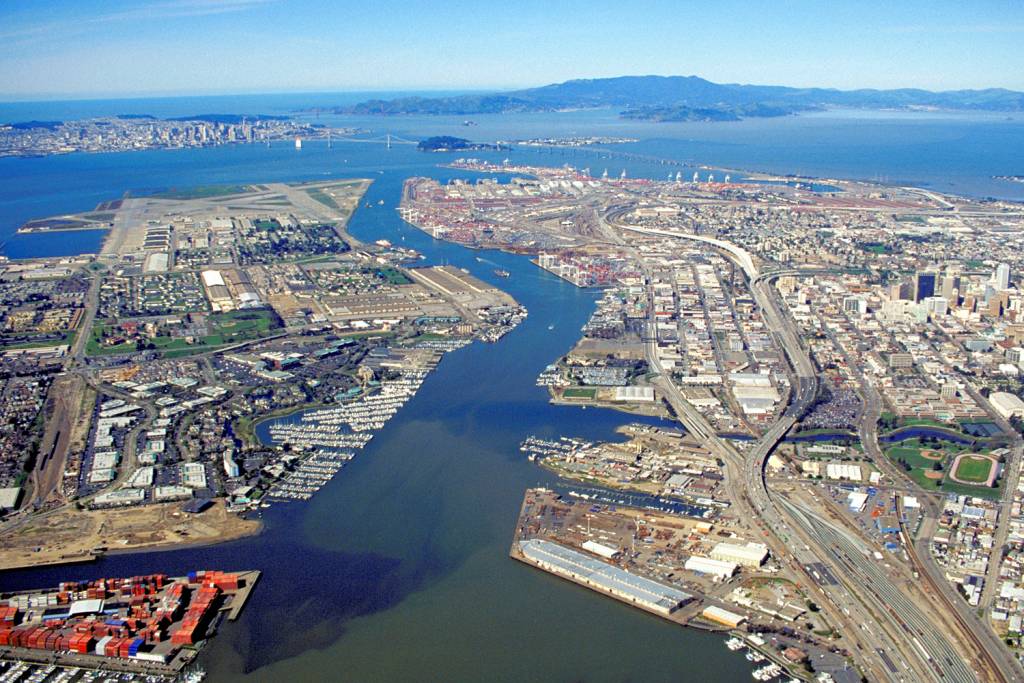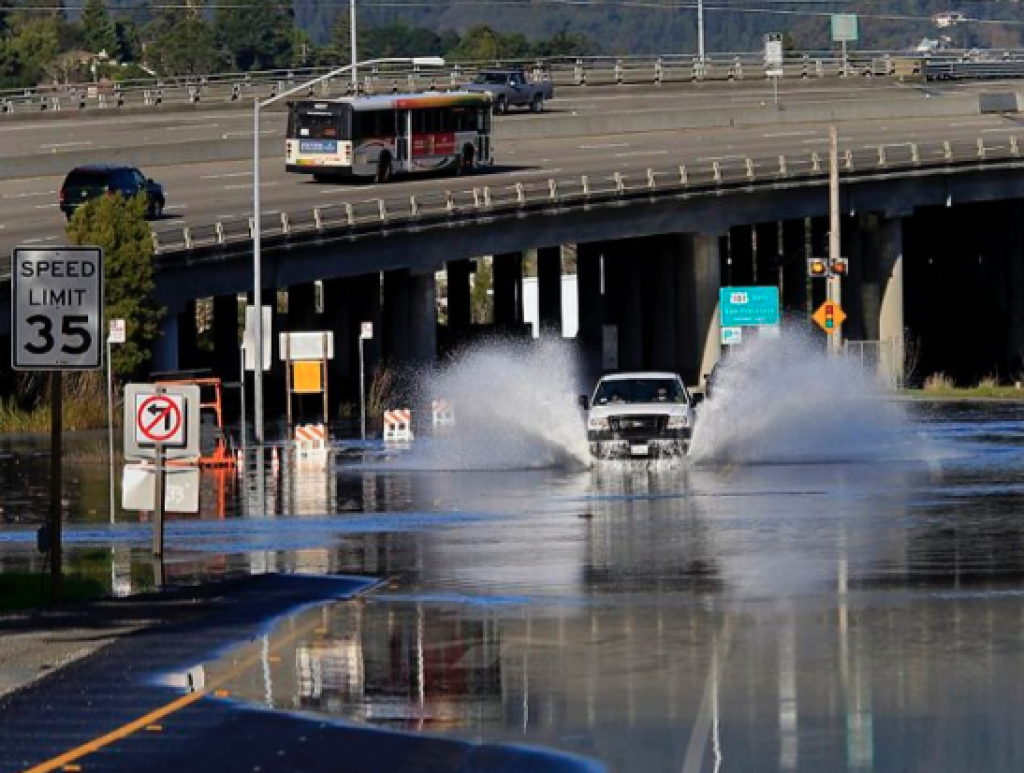
In a way, we all knew that something like sea level rise was coming to the Bay Area. It was only a matter of time, our subconsciousness told us, before the environmental crisis manifested itself in a physical, dramatic way.
But when is it happening, how, and who will be effected?

One set of answers will be explained at the “Saving the Bay From Climate Change” panel discussion on Mon/25 in San Rafael.
On the program will definitely be mentions of Measure AA, which will be on June ballots and would earmark over $500 million for Bay Area wetlands (vulnerable ecosystems when it comes to sea level rise) preservation and other projects. 501(c)(3) Time to Lead on Climate Change is a supporter of the campaign, and organizer of the “Saving the Bay” panel.
Sea level rise may be among the most pronounced signs of climate change out there today — countries like Indonesia are watching coastlines creep up to some of their major cities, and many nations like Fiji, Maldives, and the Republic of Palau may well disappear altogether, raising questions about the relocation of their peoples.
The Bay Area is unlikely to be completely obliterated in this manner, but the region faces its challenges, including flooding threats from climate change-inflated storm events to the erasure of swamplands that provide us with crucial cushioning from ocean waves.

We touched base with some of the panel discussion’s speakers about sea level rise (to freak out a little, and then) ask them basic questions about this mess.
48 HILLS How would you qualify the Bay Area’s level of preparedness when it comes to rising sea levels?
ADRIAN COVERT, POLICY DIRECTOR, BAY AREA COUNCIL Not very prepared. It’s a fast moving science. We are just beginning to understand the extent of our vulnerability, and the window we have for action is very brief.
STEVE CROOKS, CLIMATE DELEGATE, UNITED NATIONS We need to make more progress in planning for the future and preventing or reducing development in areas that will become increasingly at risk from flooding.
48 HILLS Name a place that is important to you in the Bay Area that could be affected by sea level rise.
BELLE COLE, ORGANIZER, TIME TO LEAD ON CLIMATE CHANGE The Canal Neighborhood here in San Rafael is very vulnerable, both economically and to sea level rise. It includes a diverse range of residents — some of the poorest and some quite well off, including many Latinos and Vietnamese. There’s dense housing, business districts and a beautiful shoreline park, all at risk.
ADRIAN COVERT The community of Alviso is particularly vulnerable to catastrophic flooding, but so is SFO, large portions of Marin, and many of the Bay’s wastewater treatment plants. In total, about 355,000 homes and 800 miles of roads and highways are in the flood zone. The risk and opportunity is truly regional in scope.
48 HILLS Besides checking out the panel on the 25th, what is something that a concerned resident can do to educate themselves on this matter and get involved?
BELLE COLE We urge people to vote and to insist that governments at all levels act now to deal with climate change and sea level rise — including our regional BCDC, county efforts like BayWAVE in Marin, and all cities and towns.
STEVE CROOKS There is a lot of information about climate change and its impacts on the web. I suggest checking in with trustworthy sites such as NASA, NOAA and state agencies for readable syntheses of information. We might also encourage more discussions such as those occurring on the 25th so that residents can ask questions to people working on the science and planning.
SAVING THE BAY FROM CLIMATE CHANGE
Panel Discussion
Mon/25, 7-9pm, $10 donation suggested
San Rafael Community Center, San Rafael
More info here



Measure AA… Zero accountability. Section 5.A. says the Authority Board can “amend this measure by majority vote.” i.e. just give us a revenue source and we can then change things and spend as we choose. Blank Check. Be very wary. This will become distorted in their slick ballot description language.
Ha! The Sky is Falling. The Water is Rising. They will meet and form a chicken (little) sandwich.
Attack the messenger..? I’m no climate denier, but I’m also not a knee-jerk progressive fanboy, who wants to throw money at everything, no matter the specifics involved. If you can’t see through this thinly-veiled trojan horse policy, just run along back to your pep-rally, they have more slogans you can adopt.
Vote no if you want. You’ll be no better than a Trump climate denier….no in fact you’re worse, at least those knuckle draggers can claim genuine ignorance. If you can show us where this morphing into a giveaway to business might happen have at it, until then, crawl back under your rock…and be careful, the tide is coming in!
Chicken Little likes to walk in the woods. She likes to look at the trees. She likes to smell the flowers. She likes to listen to the birds singing.
One day while she is walking an acorn falls from a tree, and hits the top of her little head.
– My, oh, my, the sky is falling. I must run and tell the lion about it, – says Chicken Little and begins to run.
She runs and runs. By and by she meets the hen.
– Where are you going? – asks the hen.
– Oh, Henny Penny, the sky is falling and I am going to the lion to tell him about it.
– How do you know it? – asks Henny Penny.
– It hit me on the head, so I know it must be so, – says Chicken Little.
– Let me go with you! – says Henny Penny. – Run, run.
So the two run and run until they meet Ducky Lucky.
– The sky is falling, – says Henny Penny. – We are going to the lion to tell him about it.
– How do you know that? – asks Ducky Lucky.
– It hit Chicken Little on the head, – says Henny Penny.
– May I come with you? – asks Ducky Lucky.
– Come, – says Henny Penny.
So all three of them run on and on until they meet Foxey Loxey.
– Where are you going? – asks Foxey Loxey.
– The sky is falling and we are going to the lion to tell him about it, – says Ducky Lucky.
– Do you know where he lives? – asks the fox.
– I don’t, – says Chicken Little.
– I don’t, – says Henny Penny.
– I don’t, – says Ducky Lucky.
– I do, – says Foxey Loxey. – Come with me and I can show you the way.
He walks on and on until he comes to his den.
– Come right in, – says Foxey Loxey.
They all go in, but they never, never come out again.
The problem is clear. A new mechanism, in which businesses can get taxpayer funds to address their problems and needs, is being proposed. That is a huge problem. Taxes on top of taxes on top of taxes. And the desire is to tax all 9 counties to benefit San Mateo and Santa Clara counties. The Measure fails to identify ANY specific areas where the funds would be spent. Parcel taxes will tax a single homeowner at the same rate as a Google building. While businesses are making record profits. It may start with talk about ecological wetlands, but it will morph into taxpayers subsidizing businesses, so they can generate profit. So much wrong. But hey, looks like you’ve bought the spin, hook line and sinker.
You’ll still be shaking your fist at business when the tide is coming under your door. Things at risk from rising tides around the bay;
1. All our oil refineries
2. All our international airports
3. Most of our water treatment plants
4. Several power generation peaker plants
5. Many major freeways including 80,880, and 101.
6 BART, Caltrain, and MUNI
I could go on and on and on…but hey, if business is supporting AA…F**K all that stuff, let it drown, I hate business!
Undoubtedly. Businesses will try to cash in on the misery of others. Some businesses will go bankrupt, including big landowners, and they will do their utmost to have everyone else bail them out, just as coal companies are doing now. Presuming that local politics is as corrupt for the next 50 years as it has been for the past 50, they’ll succeed.
In fact, good planning should account in advance for this utterly predictable kind of action. It never does.
Oh, look, the Bay Area Council is involved. That think tank that 100% advocates for the needs of businesses. And they want to enact a way for Regional taxation to be enabled. This Measure AA is but the first drop in a bucket for a NEW way to squeeze money from the public, to pay for, primarily, the needs of businesses. Could be compared to a virus…